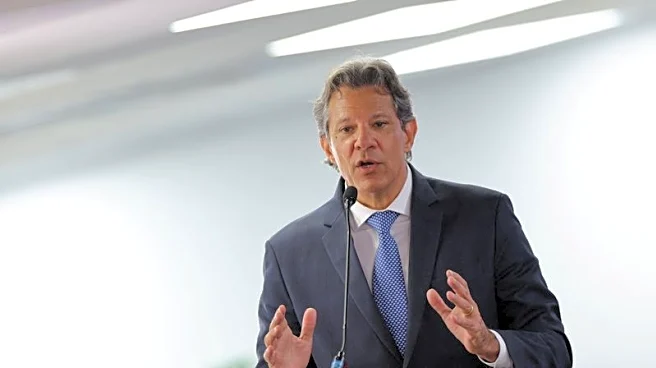What's Happening?
Nestlé has introduced a novel technique to increase the yield of cocoa fruit used in chocolate production, amid a global cocoa crisis. This new method allows the use of up to 30% more of the cocoa fruit, including parts traditionally discarded such as the pulp, placenta, and pod husk. The process involves collecting all parts of the cocoa pod as a wet mass, which ferments naturally to unlock the key chocolate flavor. This innovation is currently in the pilot stage at Nestlé's York site, where the company uses up to 12,000 tonnes of cocoa mass annually. The development comes as the cocoa sector faces challenges from disease, poor weather, and climate change, leading to supply shortages and price hikes.
Why It's Important?
The introduction of this technique by Nestlé is significant as it addresses the pressing issue of cocoa supply shortages exacerbated by climate change and disease. By maximizing the use of cocoa fruit, Nestlé aims to make chocolate production more efficient, potentially stabilizing supply chains and reducing costs. This could benefit cocoa farmers by increasing the amount of cocoa material available, allowing them to focus on other climate-friendly practices to improve yields. The innovation also reflects a broader industry trend of reformulating chocolate products to reduce cocoa content, which has led some brands to drop the term 'chocolate' from their offerings.
What's Next?
Nestlé plans to explore scaling up this innovative technique to enhance cocoa production efficiency further. As the company continues to pilot the process, it may lead to broader adoption across its production sites, potentially influencing industry standards. Stakeholders, including cocoa farmers and chocolate manufacturers, are likely to monitor the outcomes closely, as successful implementation could offer a sustainable solution to ongoing supply challenges. Additionally, Nestlé's approach may encourage other companies to invest in similar innovations to address climate-related impacts on cocoa yields.
Beyond the Headlines
This development highlights the ethical and environmental dimensions of food production, as companies like Nestlé seek sustainable solutions to resource scarcity. The technique could set a precedent for utilizing agricultural by-products, promoting waste reduction and resource efficiency. Furthermore, it underscores the importance of innovation in adapting to climate change, potentially influencing policy discussions on sustainable agriculture and food security.









